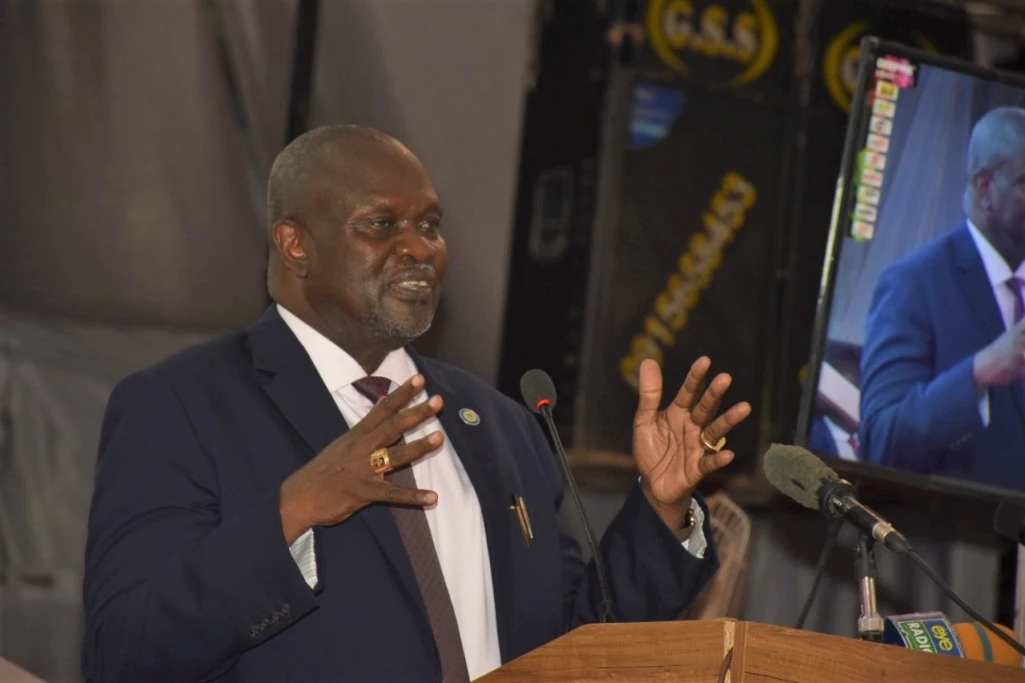
The First Vice President has urged the President to pronounce himself on the choking political space and state of security surveillance in the country.
Dr. Riek Machar said political parties are gripped with fear of being targeted by security apparatus coupled with a non-existent civic space.
“In the last 30 months [since] I came to Juba…I have not been invited for a rally and the reason is, people are afraid to hold political rallies,” he stated, adding that “you cannot transform, political parties cannot survive if there is no political space.”
The second in command who is also the leader of the main peace party, SPLM-IO made the utterances on Thursday in Juba during the signing of a roadmap to extend the transitional period until 2024.
Since his arrival in Juba in 2019, Dr. Riek Machar has not left the city or the country. He has been confined to his office and government functions – leading to some observers to believe that he is under undeclared house arrest.
“Before the war, I had many friends in this room [Freedom Hall] but if somebody want to come to my house now, he has to come by night. Why is that? This is because the system has not change. You are afraid, you might be targeted, and you might be accused of working with other political parties,” Machar lamented.
Human rights bodies have accused South Sudan’s government of having poor judicial or legislative oversight of its security organs, particularly the National Security Service [NSS].
They said NSS has become a feared agency and a vital tool in the government’s campaign of silencing dissent.
NSS was established at independence in 2011 to “collect information, conduct analysis, and advise relevant authorities”. But it is accused of repeatedly overstepping its constitutional mandate by targeting people deemed to be anti-government, including human rights defenders, journalists, opposition party members and suspected rebels, profiling them based on their ethnicity.
In 2014, shortly after civil war broke out in December 2013, the National Security Service Act expanded the NSS’s responsibilities. The new law gave it broad powers of arrest, detention, search, seizure, and surveillance. Its officers used these powers to also detained people accused of fraud, petty offences, or at the behest of individuals fulfilling personal vendettas, the Human Rights Watch reports.
In his remarks on Thursday, Dr. Riek Machar appealed to President Salva Kiir – who was also at the function – to declare an enabling environment for people to exercise their liberty.
“Mr. President, in your statement, it will be good to guide the nation on political space so that these security organs are not targeted by political parties,” he urged.
“We would like to see our national security loved by all, we would like see our police being the protector of all, we would like to see our army if one is in a bus, then a civilian will say; ‘this man dies for me, take my seat’. We would like to see these organs supporting and serving our country but without direction, things will continue [the same],” Machar added.
His remarks came after the parties signed the roadmap for the extension of the transitional period.
The 5 parties to the revitalized agreement agreed to the extension to ensure they complete the implementation of the remaining provisions in the agreement.
The previous transitional period was expected to an end in the next six months although most of the provisions in the peace deal have not been implemented.
Machar emphasized on the need to reform the security sector and allow political freedoms in order to achieve the remaining provisions of the 2018 peace deal.
“This agreement cannot be implemented in a situation that the country’s structures don’t change, the security system remain the same. It cannot implement itself because you need to disseminate it, you need these political parties to be active in forefront so that people can hold it. So it need political space. If there is no political space, you can’t at all [implement it],” he stressed.
In July, the former Ambassador of the Kingdom of Netherland to South Sudan told the 23rd meeting of R-JMEC that he was leaving South Sudan a disappointed person due to lack of civic space.
“I am really sad to be leaving South Sudan at a time when lack of political space and civic liberty remain the biggest threats to the democratization. I cannot imagine how election can help the country forward if the people are not allowed to freely debate how they want to shape their future.” Ambassador Jelte Van Wieren stated.
Last month, the head of the UN Mission in South Sudan, Nicholas Haysom, who is also the Special Representative of the UN Secretary-General in South Sudan also called for a conducive political environment for parties and South Sudanese to engage freely ahead of the elections.
He stated that for free, fair, credible, and peaceful elections to take place, the reforms envisioned in the 2018 peace deal must be met.
Until today, the National Constitution Amendment Committee – an important instrument of the revitalized peace deal – is yet to complete its task.
NCAC is mandated by the peace deal to draft and complete the Constitutional Amendment Bill and incorporate it into the transitional constitution.
The committee is mandated to review and complete amendments to relevant national security legislations to bring their provisions into conformity with the agreement.
It is also expected to amend other legislations and incorporate any reforms relevant to the peace agreement.